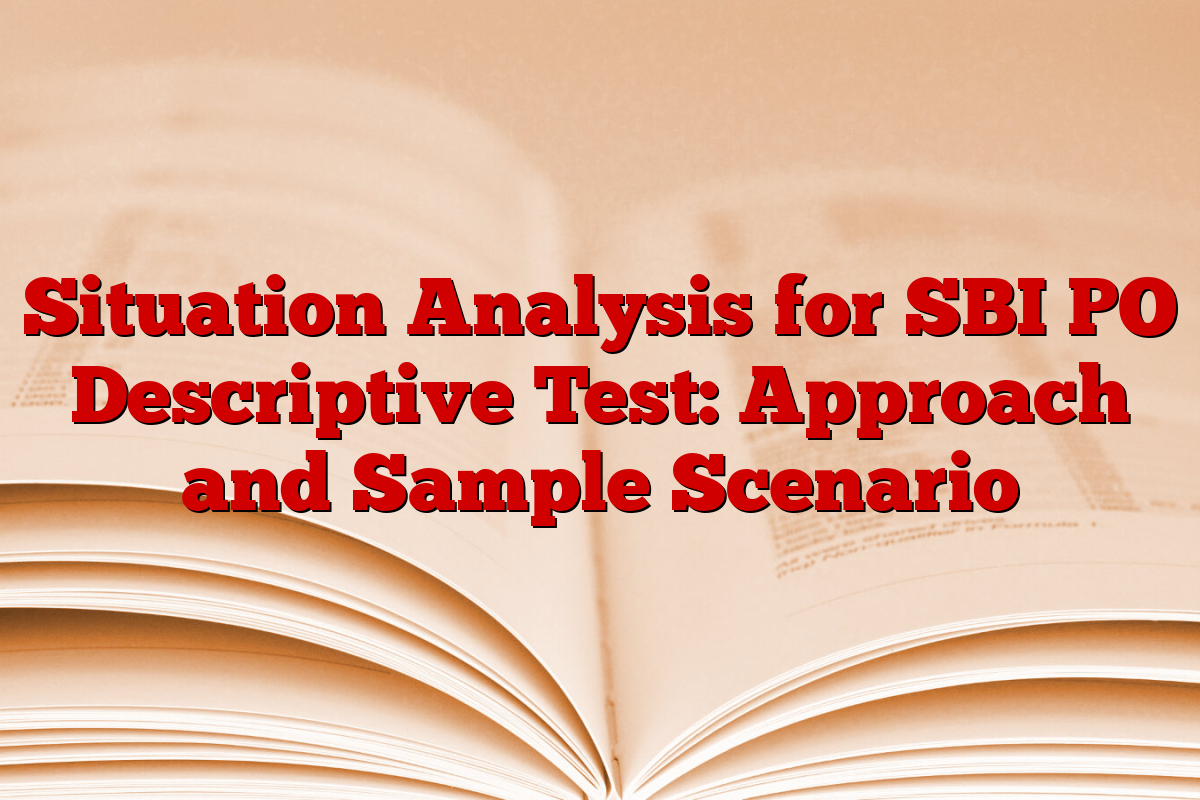State Bank of India has restructured the descriptive examination for SBI PO Mains exam, introducing email, report, situation analysis and summary writing in place of traditional essay and letter writing. The new format emphasizes candidates’ ability to critically analyze situations and communicate effectively in real-world professional scenarios. In this article, we have explored the approach to handle the Situation Analysis section and provided sample scenarios to help candidates prepare effectively.
Situation Analysis for SBI PO Descriptive Test
SBI PO descriptive test now includes tasks like emails, reports and situation analysis, which are designed to evaluate analytical thinking, decision making skills and written communication. These sections test the candidate’s ability to deliver a clear, concise and effective message in a professional context.
Also read, SBI PO Notification 2025
Situation Analysis Approach for SBI PO Descriptive Test
The updated descriptive test for SBI PO Mains exam emphasizes on practical problem-solving and communication skills. With systematic approach and constant practice, candidates can excel in situation analysis for SBI PO Descriptive Exam
understand the scenario
- Read the given situation carefully to identify the main issues and stakeholders.
- Highlight important facts and underlying problems that need resolution.
analyze options
- Consider possible solutions and their implications.
- Evaluate the pros and cons of each approach to identify the most practical solution.
structure the reaction
- Introduction: Briefly outline the scenario and primary issue.
- Analysis:Discuss possible solutions considering feasibility and impact.
- conclusion: Recommend a specific course of action supported by logical reasoning.
Be professional and precise
- Maintain a formal tone and use professional language.
- Focus on clarity and avoid unnecessary detail.
manage time effectively
- Allocate time wisely for brainstorming, writing and reviewing.
Also read, SBI PO Online Application 2025
Situation Analysis: Sample Scenarios and Suggested Responses
The sample scenarios provided here serve as a basis for sharpening analytical capabilities and ensuring success SBI PO Examination
Scenario 1: Ethical Decision Making
Situation: As a branch manager, you discover anomalies in a staff member’s transactions, raising suspicions of misconduct. How will you deal with this situation?
Response Outline:
- Introduction: Recognize the importance of maintaining ethical standards in banking.
- Analysis:Explore steps like:
- To conduct judicious preliminary investigation.
- Discuss the issue with the staff member to ask for clarification.
- If discrepancies persist, escalate the matter to higher authorities.
- conclusion: Emphasize balancing transparency and privacy while following organizational protocols.
Scenario 2: Customer complaint resolution
Situation: A long standing customer expresses dissatisfaction with the bank’s service and threatens to close his account. How will you handle the situation?
Response Outline:
- Introduction: Highlight the importance of customer retention.
- Analysis: Suggest actions like:
- Listening empathetically to customer concerns.
- To provide personalized solutions to resolve their complaints.
- Assurance of better service in future.
- conclusion: Strengthen the Bank’s commitment towards customer satisfaction.
Scenario 3: Crisis Management
Situation: During the system upgrade, technical problems disrupted banking services during peak hours. How will you handle the situation?
Response Outline:
- Introduction: Recognize the critical nature of seamless banking services.
- Analysis: Propose such steps:
- Communicating transparently with customers about the issue.
- Deploying manual processes for urgent transactions.
- Coordinating with IT team for prompt resolution.
- conclusion: Emphasize the importance of proactive crisis management and maintaining customer trust.
Tips to Excel in Situation Analysis
To excel in situation analysis for SBI PO descriptive exam, the following tips should be followed.
- stay updated: Gain knowledge of banking practices and industry trends to provide relevant solutions.
- think logically: Avoid emotional reactions; Base the analysis on facts and logical reasoning.
- practice regularly: Write responses to different scenarios to increase speed and accuracy.
- hone writing skills: Focus on grammar, vocabulary and sentence structure for clear communication.
